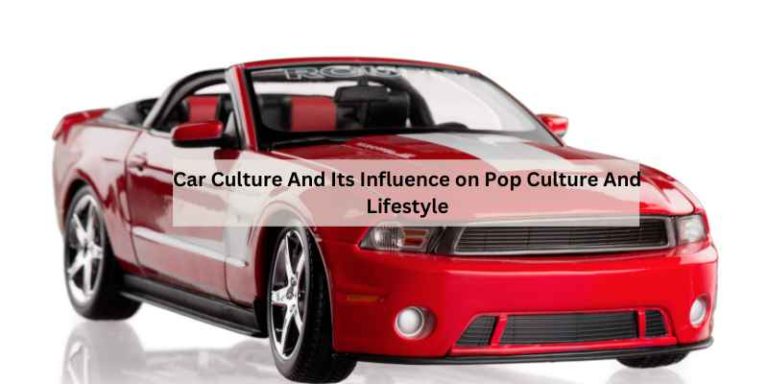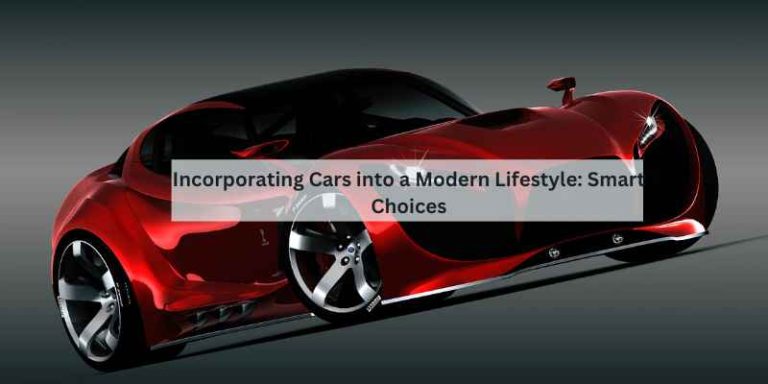Cultural Influences on Automotive Lifestyle: Trends & Shifts
Cultural influences significantly shape automotive lifestyle preferences, impacting consumer choices and industry trends worldwide. These influences encompass traditions, societal norms, economic factors, and historical values that contribute to the way people perceive and interact with automobiles.
From design preferences to vehicle usage patterns, cultural elements play a crucial role in shaping the automotive landscape. Understanding these influences is essential for automakers and marketers to develop products and campaigns that resonate with diverse consumer segments. By recognizing and adapting to cultural nuances, the automotive industry can better cater to the unique preferences and behaviors of different global markets.
This interconnected relationship between culture and automotive lifestyle preferences underscores the importance of cultural awareness in driving innovation and competitiveness in the industry.
Introduction To Automotive Lifestyle
The automotive lifestyle is heavily influenced by cultural preferences, shaping the way individuals interact with vehicles. From design to performance, cultural influences play a significant role in determining automotive lifestyle choices, reflecting the diverse tastes and values of different societies.
The Intersection Of Culture And Cars
When it comes to automotive lifestyle preferences, culture plays a significant role in shaping individual tastes and choices. The way we perceive cars and their significance is heavily influenced by our cultural backgrounds. From the type of vehicles we prefer to the way we customize and use them, culture intertwines with our automotive lifestyle in various ways.
Evolution Of The Automotive Lifestyle
The automotive lifestyle has evolved over time, reflecting the changing cultural landscape. In the early days, cars were seen as a symbol of luxury and status, accessible only to the wealthy elite. However, as the automobile industry expanded and technology advanced, cars became more affordable and accessible to the general public.
As cultures around the world embraced the convenience and freedom offered by cars, the automotive lifestyle diversified. Different regions developed unique preferences and practices, influenced by factors such as climate, geography, and societal norms. Whether it’s the love for rugged off-road vehicles in rural areas or the passion for sleek sports cars in urban environments, cultural influences shape the automotive lifestyle choices of individuals.
Moreover, automotive subcultures have emerged, creating a sense of community and identity among enthusiasts. From classic car enthusiasts to street racers, each subculture represents a distinct aspect of the automotive lifestyle, often influenced by specific cultural values and traditions.
In conclusion, the intersection of culture and cars is undeniable when it comes to understanding automotive lifestyle preferences. By examining how culture shapes our choices, we can gain a deeper appreciation for the rich tapestry of automotive cultures worldwide.
Historical Perspective
In exploring automotive lifestyle preferences, it is vital to consider the historical perspective of cultural influences. These influences shape individuals’ choices and behaviors towards vehicles, reflecting societal values and trends over time. Understanding this connection provides valuable insights into the evolution of automotive culture.
Early Automotive Culture
During the early days of the automotive industry, cultural influences played a significant role in shaping people’s preferences and attitudes towards cars. As automobiles became more accessible to the masses in the early 20th century, they quickly became a symbol of status and freedom.
People embraced the newfound mobility that cars offered, as it allowed them to explore new places and experience a sense of adventure. This cultural shift led to the emergence of road trips, where families and friends would embark on long journeys to discover the beauty of their surroundings.
Post-war Car Boom And Cultural Shifts
The post-war period brought about significant changes in the automotive industry and cultural preferences. With the end of World War II, there was a surge in economic growth and prosperity, leading to the rise of the middle class.
This newfound affluence resulted in increased car ownership, as more people could afford to buy automobiles. As a result, cars became an integral part of everyday life, transforming from a luxury item to a necessity.
Furthermore, cultural shifts such as the rise of suburban living and the popularity of drive-in theaters further reinforced the importance of cars in American culture. Suburbs offered families more space and a quieter lifestyle, while drive-in theaters provided a unique form of entertainment where people could enjoy movies from the comfort of their own vehicles.
In conclusion, the historical perspective of cultural influences on automotive lifestyle preferences highlights how cars have shaped and been shaped by society. From the early days of adventure and exploration to the post-war boom and the integration of cars into everyday life, our cultural preferences continue to evolve alongside the automotive industry.
Cars As Cultural Symbols
Cars serve as powerful symbols of culture, reflecting the values, aspirations, and identities of individuals and societies. They are not merely modes of transport; rather, they represent status, identity, and lifestyle choices deeply rooted in cultural influences.
Status And Identity
In many cultures, the type of car a person drives is intrinsically linked to their social status and personal identity. For example, luxury car brands such as Mercedes-Benz and BMW are often associated with affluence and success, while rugged off-road vehicles like Jeeps and Land Rovers convey a sense of adventure and outdoor lifestyle.
Automobiles In Media And Pop Culture
Popular media plays a significant role in shaping cultural perceptions of automobiles. From iconic movie cars like the Batmobile and James Bond’s Aston Martin to the portrayal of fast and furious street racing in the “The Fast and the Furious” franchise, cars are often depicted as symbols of power, freedom, and rebellion in mainstream entertainment.
Global Trends In Automotive Culture
Automotive culture is greatly influenced by various cultural factors such as geography, social status, and personal values. These factors greatly affect the preferences of individuals towards certain car models, brands, and lifestyles associated with the automotive industry. As globalization continues to progress, it is expected that cultural influences on automotive culture will become even more diverse and nuanced.
Cars have become an integral part of modern society, and automotive lifestyle preferences are heavily influenced by the culture and traditions of a particular region. Global trends in automotive culture are shaped by a range of factors, including economic conditions, societal values, and technological advancements.
Understanding these trends is crucial for automakers, as it helps them to design and market their vehicles more effectively. In this section, we will explore some of the global trends in automotive culture, with a focus on the differences between East and West perspectives and the influence of emerging markets.
East Vs. West: Differing Perspectives
Cultural differences between the East and West have a significant impact on automotive lifestyle preferences. In the West, cars are often seen as a status symbol, with luxury and performance being key drivers of consumer demand. In contrast, the East places greater emphasis on practicality and affordability, with fuel efficiency and reliability being the primary concerns. Additionally, the East has a strong preference for smaller cars, while the West tends to favor larger vehicles.
Emerging Markets And Their Influence

Emerging markets such as China, India, and Brazil are rapidly becoming major players in the automotive industry. These markets have unique cultural and economic conditions that shape consumer preferences, and automakers are adapting their strategies accordingly.
In China, for example, there is a growing demand for electric vehicles, due in part to concerns over air pollution. In India, affordability is a key consideration, and the market is dominated by small, budget-friendly cars. Brazil has a strong tradition of automotive racing, and performance is highly valued by consumers.
In conclusion, global trends in automotive culture are shaped by a range of factors, including cultural traditions, economic conditions, and technological advancements. Understanding these trends is essential for automakers, as it helps them to design and market their vehicles more effectively. By adapting their strategies to meet the unique needs and preferences of different regions, automakers can stay ahead of the curve and remain competitive in a rapidly changing industry.
Sustainability And Its Impact
Cultural influences play a significant role in shaping automotive lifestyle preferences, impacting sustainability. These influences affect consumer choices, driving the demand for eco-friendly vehicles and influencing the overall impact on the environment. Sustainable practices within automotive culture are increasingly prioritized due to cultural influences.
The Rise Of Electric Vehicles
In recent years, electric vehicles have gained popularity.
They offer a sustainable alternative to traditional cars.
EVs help reduce emissions and promote eco-friendly practices.
Many consumers are embracing electric vehicles for their environmental benefits.
Environmentalism And Car Culture
Environmental consciousness is shaping car culture preferences.
Consumers are increasingly considering the environmental impact of their vehicles.
Sustainability has become a key factor in automotive lifestyle choices.
The shift towards eco-friendly options is evident in the rising demand for hybrid and electric vehicles.
Technology’s Role In Shaping Automotive Lifestyle
In the modern automotive landscape, technology plays a pivotal role in shaping lifestyle preferences. From connectivity and in-car entertainment to the advent of autonomous vehicles, technological advancements have significantly influenced the way people engage with automotive culture.
Connectivity And In-car Entertainment
Seamless integration of smartphones and other devices has revolutionized in-car entertainment, allowing for personalized music playlists, navigation, and hands-free communication.
Autonomous Vehicles And Future Trends
The emergence of autonomous vehicles represents a significant shift in automotive lifestyle preferences, paving the way for safer and more efficient transportation. This trend is expected to continue influencing consumer behavior and urban planning in the future.
Automotive Lifestyle In The Digital Age
Automotive Lifestyle in the Digital Age is shaped by cultural influences and technology advancements.
Social Media And Car Enthusiast Communities
Social media platforms connect car enthusiasts worldwide, fostering a sense of community.
Virtual Reality And Car Customization
Virtual reality technology allows car enthusiasts to visualize and customize their dream cars.
Economic Factors And Their Influence
Cultural influences play a significant role in shaping automotive lifestyle preferences. Among these, economic factors have a substantial impact on the choices individuals make when it comes to vehicles.
The Luxury Market And Exclusivity
In the luxury market, exclusivity drives consumer behavior. High-end vehicles cater to those seeking status symbols.
Affordability And The Used Car Market
The affordability factor influences many to turn towards the used car market for budget-friendly options.

Frequently Asked Questions
What Was The Cultural Significance Of The Automobile?
The automobile had a significant cultural impact, revolutionizing transportation and transforming society. It provided mobility, allowing people to travel farther and faster, enabling suburbanization and changing the way people lived, worked, and socialized. The car also influenced fashion, music, and popular culture, becoming a symbol of freedom, status, and personal expression.
What Are The Social Factors Affecting The Automobile Industry?
Social factors such as changing consumer preferences, economic conditions, and cultural shifts significantly influence the automobile industry. Consumer demand for eco-friendly vehicles, economic downturns impacting purchasing power, and evolving cultural attitudes towards car ownership are key social factors affecting the industry.
How Have Cars Impacted Culture?
Cars have profoundly impacted culture by enabling mobility, reshaping urban landscapes, and influencing lifestyle choices. They have revolutionized travel, facilitated suburban expansion, and symbolized freedom and status. Additionally, they have inspired art, music, and fashion, shaping modern society’s values and aspirations.
What Was The Impact Of The Automobile And Its Culture In The Us?
The automobile had a significant impact on US culture. It transformed transportation, allowing for faster and more efficient travel. It also led to the development of suburbs and the growth of the tourism industry. However, it also caused environmental damage and increased traffic congestion.
Overall, the automobile changed the way Americans live, work, and play.
Conclusion
The automotive industry is not just about cars, but also about the people who drive them. Culture plays a significant role in shaping the lifestyle preferences of car enthusiasts. From the type of car to the way it’s customized, cultural influences cannot be ignored.
Understanding these influences can help car companies develop better marketing strategies and create products that cater to their target audience. As we move towards a more diverse and interconnected world, cultural influences will continue to shape the automotive industry in exciting ways.








